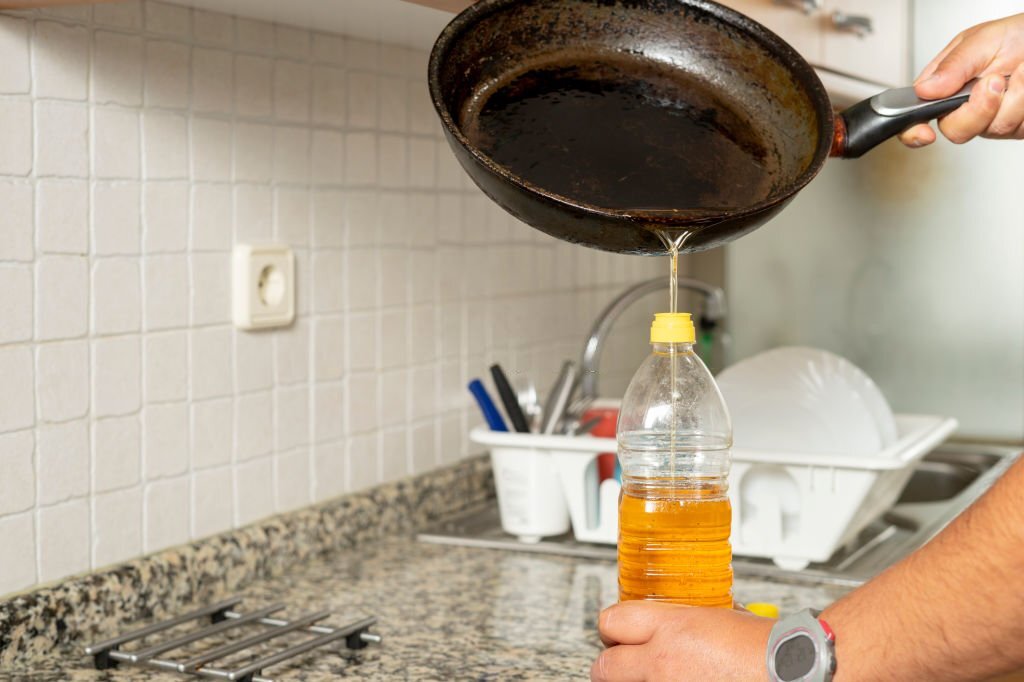Used Cooking Oil AM Brothers Recycling
Used Cooking Oil are fats and oils that have been used for frying or cooking in the fast-food business, restaurants, and homes of consumers. They fall under the category of Municipal Wastes in the European Waste Catalogue (EWC) (household waste and similar commercial, industrial and institutional wastes). UCO obtained from waste water treatment facilities is also regarded as non-hazardous substance with a distinct classification as (oil/water mixture including edible oil and fats; grease and oil mixture).
According to estimates, 90% of the cooking fat and oils used in the EU today are made from vegetable oils, while comparatively considerable amounts of animal fats are still utilized in places like Belgium. The amount of UCO that could be collected, according to EU estimates, is about 8L year. Following the annual increase in the use of cooking oil in the EU-15, this potential grows by about 2% annually. The infrastructure used for collection needs to be enhanced in order to reach this level of collection.
Manufacturing Of Used Cooking Oil With Us
Although we are unsure of the supply that other businesses collect, the used vegetable oil that we purchase from businesses is processed first at our center. There, we filter the oil and eliminate any trace amounts of sauces, undesirable liquids, and food particles. The refined oil is subsequently given to our partners, who use it in a range of goods.
Cooking Oil Is Used As An Ingredient In Different Products
The following list comprises the primary applications for yellow grease but does not comprise the industries served by the manufacturers we supply:
- Biofuel
- Soap
- Furniture and appliance protection
- Car cleaning material
- Shampoo and moisturizer
- Lubricants
- Lamp oil
- Composting
- Cosmetics
- frying oil
- Pet food
Let’s go over some of these in more detail.
Biofuel:
An important component in the production of biofuel, specifically biodiesel, is used cooking oil. It is a sustainable fuel made from animal fats and vegetable oils, including soybean, canola, corn, grapeseed, sunflower, and palm. Biofuels are in great demand as a result of the enhanced U.S. Renewable Fuel Standard. Federal regulation requires suppliers of transportation fuels (diesel and gasoline) to mix a negligible amount of biofuels into their products. It attempts to lessen both greenhouse gas emissions and America’s reliance on fossil fuels.
Soap Making By Used Cooking Oil
An alkaline base (often sodium hydroxide, also known as lye) and fat are the two main components of saponification, the chemical process that generates soap (oil). Although it is a simple procedure that you may perform in small batches at home, we’re talking about large manufacturers here. The cold process and the hot process are two widely used ways to make soap. Both begin by heating the oil to 110°F (43°C) before adding the lye solution, albeit their methods differ slightly. Once the mixture has reached trace, or the point at which the soap has emulsified and is prepared to be poured into a mould, the oil and lye are then combined.
Role Of Used Cooking Oil In Cosmetics
Oil is a key component in the creation of cosmetics, including skincare, hair care, and makeup like foundation, lipsticks, concealers, and eye shadow. These have a silky texture and an easy-to-spread quality due to their oil content, which ranges from 1% to 99%. Yeast is added to UCO by cosmetics producers so that it can ferment and produce biodegradable surfactants.
Animal Feeds With Used Cooking Oil
Today, companies that generate animal feed recycle fats and oils to create animal feed. However, the procedure is more challenging than producing soap or cosmetics. Australian feed manufacturers, for instance, are required to adhere to tight standards for their UCO supplies, formulation, and purification and integration procedures. Similar practices are used throughout the world, including in Europe.
Fertilizer In The Future Used Cooking Oil
A group of chemists at Flinders University in South Australia has made a breakthrough that may open up new markets for UCO. They created a new, controlled-release fertilizer polymer using canola oil and sulphur. It might store potassium, phosphate, and nitrogen before slowly releasing those nutrients into the soil via water diffusion. According to the researchers, the polymer matrix may even be changed to control how quickly, how much, or how little fertilizer is released into the soil.
Used Cooking Oil Recyling, Transport And Storage
- There are three main UCO gathering methods that we have identified:
- Processor Decentralized collection: In order to collect money from UCO’s “producers” directly, we built up a door-to-door method.
- Processor Centralized collection: UCO is delivered at centralized collection stations by its “producers.” They are directly collected from these places by us.
In addition to providing the raw vegetable oils to the UCO “producers,” we also collect them for recycling.
The Used Cooking Oil Supply Chain Consists Of The Following Steps
- Site of production:The location where the UCO is made.
- Spot terminal:The initial location where UCO is gathered.
- Filling Hub: This terminal is where UCO is loaded onto trucks for the last stage of the process; this is where UCO made from various oils is blended.
Pre-Treated Of Used Cooking Oil
Water and other impurities found in UCO must be eliminated before transesterification may take place. FFAs actually form soap when they interact with the alkaline catalyst, inhibiting the process and lowering the yield of biodiesel. The transesterification process is compromised by an FFA concentration above 3.0%. Both the quality and the cost of UCO were based on the acid and saponification levels.
There are numerous methods for removing the UCO’s FFA component.Extraction with polar liquids, acid esterification, distillation of FFA, neutralisation with alkalis after soap separation by a decanter, esterification with ion exchange resins, esterification with methanol and sulphuric acid, and esterification with resins.
Oil Collection Services
At Baker Commodities, we administration an extensive variety of business with out utilized cooking oil and oil expulsion administrations.
